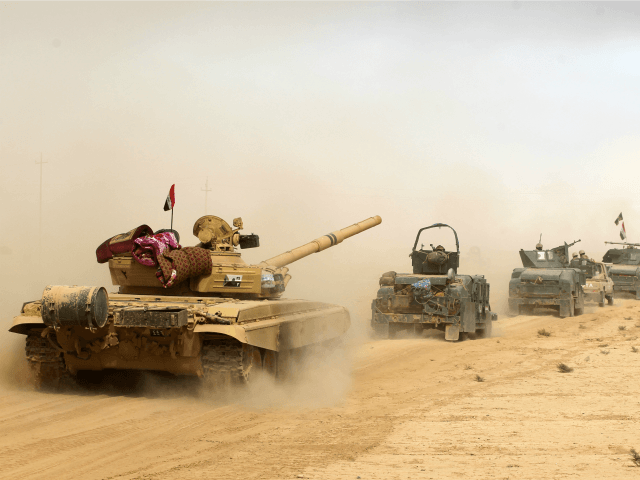WASHINGTON (AP) — More is riding on the battle for Mosul than the recapture of the Islamic State group’s main stronghold in northern Iraq. Also on the line is the Obama administration’s theory that the extremists can be defeated in Iraq, Syria and elsewhere without American ground troops doing the fighting.
For more than two years, the administration has stuck to its argument that the only path to a sustained victory over the Islamic State group is for locals, not Americans or other outsiders, to bear the main responsibility for the fighting and for governing after the extremists are removed.
President Barack Obama has taken a lot of political heat for that approach, which critics say has allowed IS to expand its international reach and influence.
The viability of Obama’s strategy has been widely doubted. In May 2015, after months of US bombings in Iraq and while in the midst of Americans training and advising Iraqi ground troops, the Iraqis lost the city of Ramadi. Defense Secretary Ash Carter publicly said he doubted the Iraqis’ will to fight. Since then, the US support role has grown and the Iraqi security forces have managed to retake key parts of western and northern Iraq, including Ramadi.
Mosul is different, not least because it is the place where Islamic State leaders in 2014 announced their intent to create an Islamic-run state after taking a large swath of Iraq and Syria in a lightning surge.
White House press secretary Josh Earnest on Monday called Mosul a new measure of Obama’s strategy.
“And I think the president would be the first to acknowledge that this is a significant test,” he said, given the size of the city and its importance to IS. “Dislodging them from the city would be a significant strategic gain,” Earnest said.
US airpower played a key role in the run-up to the fight for Mosul by taking out Islamic State defenses, cash resources, supply routes and some of the group’s leaders. The US is now providing air cover as Iraqi security forces and members of the Kurdish militia begin their attempt to retake the city over the next several weeks. American advisers are working with Iraqi troops, but the outcome will be determined largely by the Iraqis.
Mosul may answer the question: If IS loses a crown jewel of its so-called caliphate, will that be a decisive and sustainable victory for Iraq? Or will Baghdad once again falter, allowing sectarian and political divisions to destabilize the country and permit a return of extremists?
That likely won’t be known before Obama’s successor takes office. The next president also will inherit the broader problem of Syria — not just the IS presence there, including in its self-proclaimed capital of Raqqa, but also the civil war with its complications involving Russia, Iran and Turkey.
Iraq remains deeply divided, and the grievances among the country’s Sunni, Shiite and Kurdish populations that allowed IS to rise to power in the first place have not been resolved. Even if the Mosul campaign is successful militarily, there is a risk of violence erupting again in the form of revenge killings or clashes between groups once allied against a common enemy.
Seth Jones, a defense and security expert at the RAND Corp., says the combat phase of the battle for Mosul, while difficult, will be “much easier” than the aftermath.
“I think there’s a strong possibility that a lot of the political grievances actually get accentuated,” he said in an interview Friday.
David Petraeus, the former Army general who commanded U.S. and coalition forces in Iraq in 2007-08, calls the Obama approach in Iraq and Syria “a new way of fighting.”
“It’s much more sustainable in terms of blood and treasure than obviously having our forces have to do it,” Petraeus, who also served as Obama’s CIA director, said Sunday on ABC’s “This Week.”
Obama began sending small numbers of US military advisers to Iraq in the summer of 2014, after the Islamic State had swept into Mosul and also captured much of western Iraq, including cities like Ramadi and Fallujah where American ground troops had spilled much blood before all US troops left Iraq in 2011. The rise of IS in Iraq was a stinging blow to Obama, whom critics accused of giving up hard-fought gains.
He initially insisted there would be no US “boots on the ground,” but he authorized a gradual expansion of the US training and advising effort to complement a US-led coalition air campaign. He was supported in his cautious, go-slow approach by his top military adviser at the time, Gen. Martin Dempsey, who was chairman of the Joint Chiefs of Staff when IS moved into Iraq and when Obama began returning US advisers to Baghdad.
Dempsey counselled patience. Give the Iraqis time to heal their internal divisions and fight their own battles, he argued. Resist the temptation to grab control of the contest against the Islamic State. Dempsey believed an enduring victory would require a unified Iraq supported by neighbors.
“If we were to take control of this campaign, I mean literally seize control of the campaign, then there’s no doubt in my mind we would probably defeat ISIL on, let’s say, a faster timeline,” but it would not last, he said in June 2015. “Maybe ISIL goes away, maybe they’re defeated militarily, and two years from now another group with another name and another ideology … will just be back,” he said.
In the Obama view, Iraq is more likely to regain, and retain, control of its territory if it is not relying on US troops to do the fighting. Mosul is the biggest test of that theory.

COMMENTS
Please let us know if you're having issues with commenting.